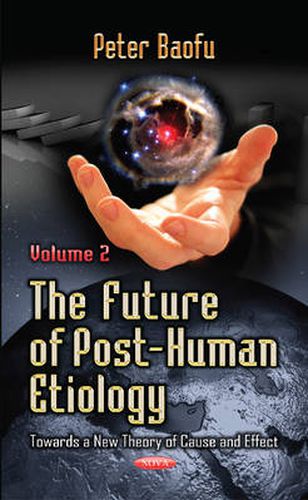Future of Post-Human Etiology: Towards a New Theory of Cause & Effect -- Volume 2
Peter Baofu, PhD

Future of Post-Human Etiology: Towards a New Theory of Cause & Effect – Volume 2
Peter Baofu, PhD
Is the traditional understanding of cause and effect in aetiology so certain that Arthur Eddington therefore proposed in 1927 the arrow of time, or time’s arrow involving the ‘one-way direction’ or ‘asymmetry’ of time , such that a cause precedes its effect: the causal event occurs before the event it affects. Thus causality is intimately bound up with time’s arrow ? (WK 2014) This certain view on cause and effect can be contrasted with an opposing view by Michael Dummett, who suggested instead, back in 1957, that there was no philosophical objection to effects preceding their causes , or what is now known as retrocausality . (WK 2014a) Contrary to these opposing views (and other ones as will be discussed in the book), aetiology (in relation to cause and effect) are neither possible (or impossible) nor desirable (or undesirable) to the extent that the respective ideologues (on different sides) would like us to believe. Of course, this questioning of different opposing views on cause and effect does not mean that the study of aetiology is useless, or that those diverse fields (related to aetiology) – like physics, engineering, biology, philosophy, medicine, epidemiology, government, geography, spatial analysis, psychology, statistics, mathematics, economics, management, history, law, sociology, theology, and so on – are worthless. (WK 2014b & 2014c) In fact, neither of these extreme views is plausible. Rather, this book offers an alternative (better) way to understand the future of aetiology in regard to the dialectic relationship between cause and effect – while learning from different approaches in the literature but without favouring any one of them (nor integrating them, since they are not necessarily compatible with each other). More specifically, this book offers a new theory (that is, the pluralist theory of aetiology) to go beyond the existing approaches in a novel way, and is organised in four chapters.
This item is not currently in-stock. It can be ordered online and is expected to ship in approx 4 weeks
Our stock data is updated periodically, and availability may change throughout the day for in-demand items. Please call the relevant shop for the most current stock information. Prices are subject to change without notice.
Sign in or become a Readings Member to add this title to a wishlist.


